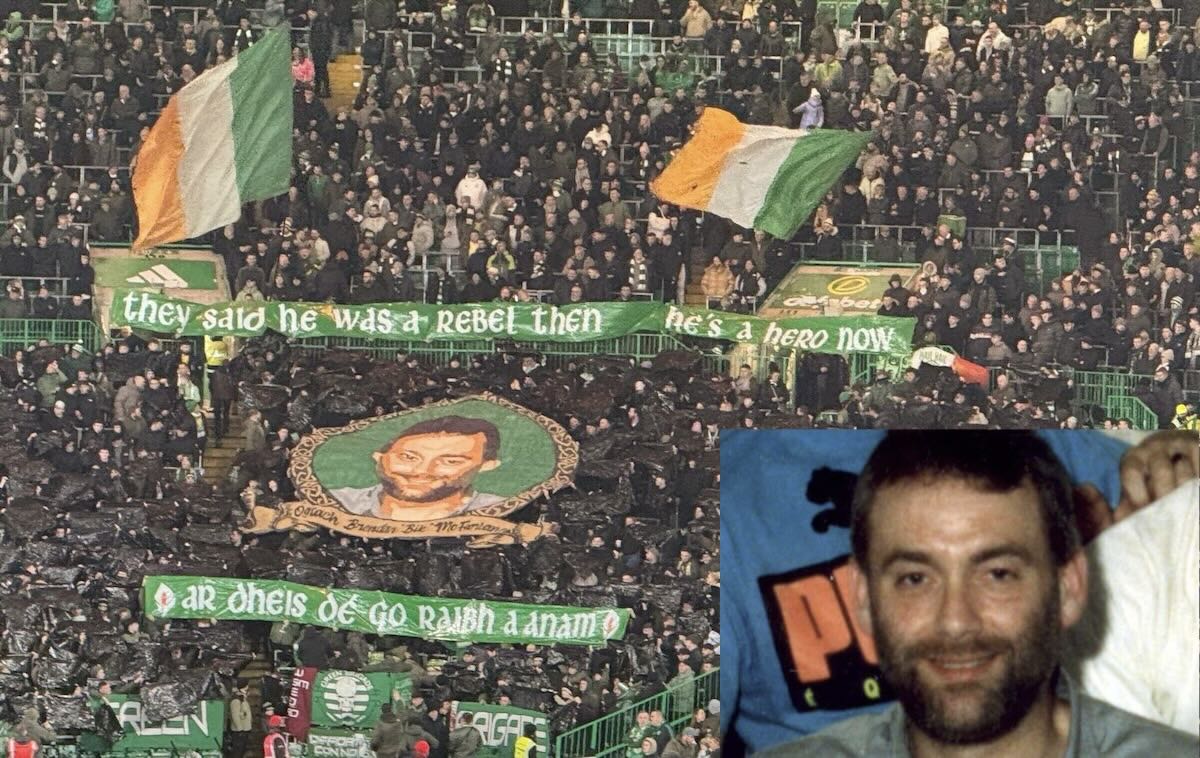
Republicans around the world have been paying tribute to former senior IRA Volunteer Brendan ‘Bik’ McFarlane, a legend of the conflict who played a major part in the 1981 hunger strike.
Originally from the Ardoyne area of north Belfast, ‘Bik’ died at the age of 74 after a short illness on Friday.
A famous figure within republican circles, he was the Officer Commanding IRA prisoners in Long Kesh during the 1981 hunger-strike when ten republicans died between May and August – taking over the role from Bobby Sands in March of that year.
He also led the mass break-out of the prison in September 1983 when 38 IRA prisoners escaped in the biggest escape in British penal history.
In 1986 he was recaptured in Holland and extradited back to the North of Ireland, finally being released from prison in 1997. He subsequently became a popular musician, celebrating Irish republicanism through story and song.
Mourners including former Sinn Féin President Gerry Adams gathered outside his family home off the Cliftonville Road on Tuesday for a funeral service and blessing by priest Father Gary Donegan.
Fr Gary Donegan told mourners that Bik faced his illness with such “courage and fortitude”.
Amid emotional scenes his daughter, Tina told mourners she “loved” and will “miss her daddy so much”, as she touched his coffin.
Matt Malloy of the Chieftains played the flute as the Irish flag was placed on the coffin.
A crowd of thousands followed as a lone piper led the funeral procession to Milltown Cemetery, where in a graveside oration, friend and comrade Gerry Kelly said the best tribute to McFarlane’s life would be a reunited Ireland.
Speaking at the graveside, Mr Kelly said of his friend: “He was an ordinary man who lived through extraordinary challenges and rose to meet every challenge with intelligence, determination, strength and compassion in equal measure. He never gave up.”
Mr Kelly recalled being on the run with McFarlane across Europe, and paid tribute to him for having been a key part of the planning of the “audacious escape”.
“It still sends shockwaves through the British government and was worldwide news,” he said.
Mr Kelly said that as a teenager, Bik had intended to become a priest and entered a seminary in Wales, but returned home to Belfast at the start of the Troubles.
“He was determined to defend his community. He decided as many others did at the time that armed resistance was the only way to face an occupying military force,” he said, and described the early to mid-1970s as “the darkest years of the conflict”.
Mr Kelly said Mr McFarlane went on to “throw himself into local politics and community work” following his release from prison in 1997.
“He supported the negotiations for the Good Friday Agreement and used his very strong influence talking to others,” he said.
“He was a huge part of getting me elected as an MLA for North Belfast in 1998.
“He had no interest in becoming an elected representative but was a driving force in North Belfast and increasing our vote, election after election.”
Mr Kelly added: “Irish unity of course will not just happen. We need to make it happen, working together by continuing to put our shoulders to the wheel as Bik did all his life. We will finish the task ahead.
“We will achieve a united Ireland, a new republic for the rights and identity of all people living on this island of whatever persuasion or background will be welcomed.
“That will be the most fitting tribute we can give to our friend and comrade Bik McFarlane.”
Mr McFarlane was a trustee of the Irish Republican Felons Association, who said they were “heartbroken” to learn of his passing.
“Bik dedicated his life to the Republican struggle and has been to the fore in every phase of it.
“Be it on active service, in prison or in the political sphere, he was never found wanting. His loss will be felt enormously by so many people in Ireland and far far beyond.
“Our association had such a special relationship with him, and we will miss him dearly.
In a social media post, a spokesperson for the Irish Republican Socialist Party also paid tribute. They said ‘Bik’ McFarlane’s role during the hunger strikes would never be forgotten.
The importance of that role has been documented in texts such as ‘Ten Men Dead’, by the late David Beresford.
Speaking in 2006, Mr McFarlane admitted he felt “pressure and heartache” but which “paled into insignificance when you looked at the suffering of the Hunger Strikers and their families”.
The IRSP said Bik “held one of the most mentally exhausting positions within the IRA structure in the H-Blocks—at the very forefront of the prison struggle.
“It took immense strength and dedication not only to maintain momentum but also to make the heartbreaking decisions he faced—sending comrades on Hunger Strike, knowing they were walking towards death.
“It’s important to remember that Bik repeatedly put himself forward as the next Hunger Striker at every stage, though the leadership on the outside denied his requests.
“The pressure he endured was unimaginable. Most would have buckled under its weight, but not Bik. His commitment to the cause of Irish freedom was unwavering.
“While we rightfully honour the ten IRA and INLA Hunger Strikers as the brave men they were, we must also remember leaders like Bik, as well as all the blanket men and women who shattered Thatcher’s grip and smashed the H-Blocks.”
A giant banner honouring the republican legend was also unfurled by fans during a match by Glasgow Celtic FC in the team’s stadium.
The tribute included a photo and the words “Óglach Brendan ‘Bik’ McFarlane”, while second banner read: “They said he was a rebel then, he’s a hero now”.
![[Irish Republican News]](https://republican-news.org/graphics/title_gifs/rn.gif)
![[Irish Republican News]](https://republican-news.org/graphics/title_gifs/harp.gif)

